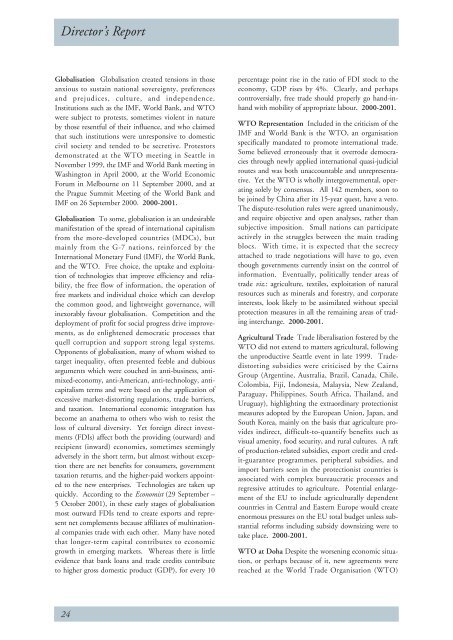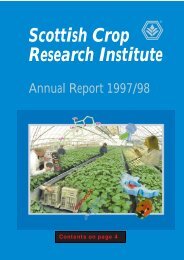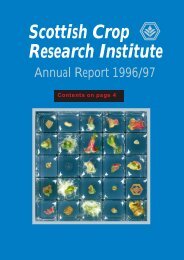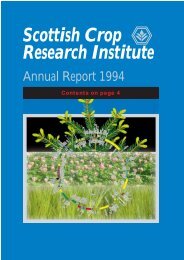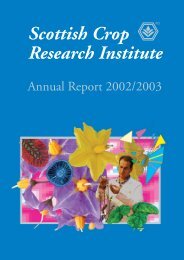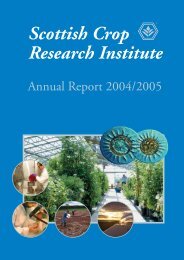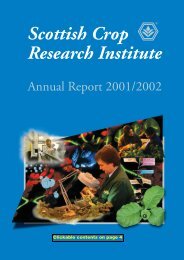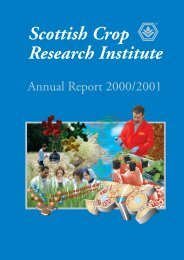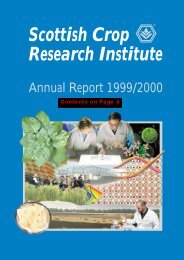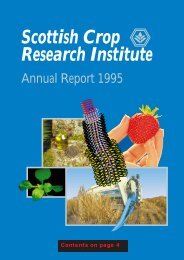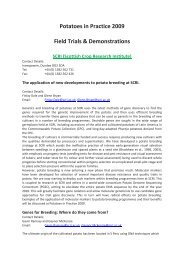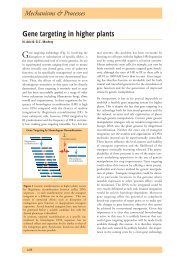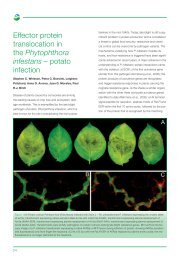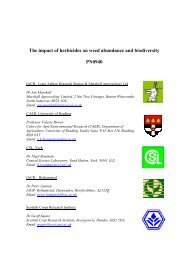SCRI Annual Report 2003/2004 - Scottish Crop Research Institute
SCRI Annual Report 2003/2004 - Scottish Crop Research Institute
SCRI Annual Report 2003/2004 - Scottish Crop Research Institute
Create successful ePaper yourself
Turn your PDF publications into a flip-book with our unique Google optimized e-Paper software.
Director’s <strong>Report</strong><br />
Globalisation Globalisation created tensions in those<br />
anxious to sustain national sovereignty, preferences<br />
and prejudices, culture, and independence.<br />
Institutions such as the IMF, World Bank, and WTO<br />
were subject to protests, sometimes violent in nature<br />
by those resentful of their influence, and who claimed<br />
that such institutions were unresponsive to domestic<br />
civil society and tended to be secretive. Protestors<br />
demonstrated at the WTO meeting in Seattle in<br />
November 1999, the IMF and World Bank meeting in<br />
Washington in April 2000, at the World Economic<br />
Forum in Melbourne on 11 September 2000, and at<br />
the Prague Summit Meeting of the World Bank and<br />
IMF on 26 September 2000. 2000-2001.<br />
Globalisation To some, globalisation is an undesirable<br />
manifestation of the spread of international capitalism<br />
from the more-developed countries (MDCs), but<br />
mainly from the G-7 nations, reinforced by the<br />
International Monetary Fund (IMF), the World Bank,<br />
and the WTO. Free choice, the uptake and exploitation<br />
of technologies that improve efficiency and reliability,<br />
the free flow of information, the operation of<br />
free markets and individual choice which can develop<br />
the common good, and lightweight governance, will<br />
inexorably favour globalisation. Competition and the<br />
deployment of profit for social progress drive improvements,<br />
as do enlightened democratic processes that<br />
quell corruption and support strong legal systems.<br />
Opponents of globalisation, many of whom wished to<br />
target inequality, often presented feeble and dubious<br />
arguments which were couched in anti-business, antimixed-economy,<br />
anti-American, anti-technology, anticapitalism<br />
terms and were based on the application of<br />
excessive market-distorting regulations, trade barriers,<br />
and taxation. International economic integration has<br />
become an anathema to others who wish to resist the<br />
loss of cultural diversity. Yet foreign direct investments<br />
(FDIs) affect both the providing (outward) and<br />
recipient (inward) economies, sometimes seemingly<br />
adversely in the short term, but almost without exception<br />
there are net benefits for consumers, government<br />
taxation returns, and the higher-paid workers appointed<br />
to the new enterprises. Technologies are taken up<br />
quickly. According to the Economist (29 September –<br />
5 October 2001), in these early stages of globalisation<br />
most outward FDIs tend to create exports and represent<br />
net complements because affiliates of multinational<br />
companies trade with each other. Many have noted<br />
that longer-term capital contributes to economic<br />
growth in emerging markets. Whereas there is little<br />
evidence that bank loans and trade credits contribute<br />
to higher gross domestic product (GDP), for every 10<br />
percentage point rise in the ratio of FDI stock to the<br />
economy, GDP rises by 4%. Clearly, and perhaps<br />
controversially, free trade should properly go hand-inhand<br />
with mobility of appropriate labour. 2000-2001.<br />
WTO Representation Included in the criticism of the<br />
IMF and World Bank is the WTO, an organisation<br />
specifically mandated to promote international trade.<br />
Some believed erroneously that it overrode democracies<br />
through newly applied international quasi-judicial<br />
routes and was both unaccountable and unrepresentative.<br />
Yet the WTO is wholly intergovernmental, operating<br />
solely by consensus. All 142 members, soon to<br />
be joined by China after its 15-year quest, have a veto.<br />
The dispute-resolution rules were agreed unanimously,<br />
and require objective and open analyses, rather than<br />
subjective imposition. Small nations can participate<br />
actively in the struggles between the main trading<br />
blocs. With time, it is expected that the secrecy<br />
attached to trade negotiations will have to go, even<br />
though governments currently insist on the control of<br />
information. Eventually, politically tender areas of<br />
trade viz.: agriculture, textiles, exploitation of natural<br />
resources such as minerals and forestry, and corporate<br />
interests, look likely to be assimilated without special<br />
protection measures in all the remaining areas of trading<br />
interchange. 2000-2001.<br />
Agricultural Trade Trade liberalisation fostered by the<br />
WTO did not extend to matters agricultural, following<br />
the unproductive Seattle event in late 1999. Tradedistorting<br />
subsidies were criticised by the Cairns<br />
Group (Argentine, Australia, Brazil, Canada, Chile,<br />
Colombia, Fiji, Indonesia, Malaysia, New Zealand,<br />
Paraguay, Philippines, South Africa, Thailand, and<br />
Uruguay), highlighting the extraordinary protectionist<br />
measures adopted by the European Union, Japan, and<br />
South Korea, mainly on the basis that agriculture provides<br />
indirect, difficult-to-quantify benefits such as<br />
visual amenity, food security, and rural cultures. A raft<br />
of production-related subsidies, export credit and credit-guarantee<br />
programmes, peripheral subsidies, and<br />
import barriers seen in the protectionist countries is<br />
associated with complex bureaucratic processes and<br />
regressive attitudes to agriculture. Potential enlargement<br />
of the EU to include agriculturally dependent<br />
countries in Central and Eastern Europe would create<br />
enormous pressures on the EU total budget unless substantial<br />
reforms including subsidy downsizing were to<br />
take place. 2000-2001.<br />
WTO at Doha Despite the worsening economic situation,<br />
or perhaps because of it, new agreements were<br />
reached at the World Trade Organisation (WTO)<br />
24


